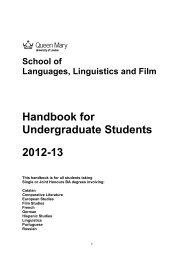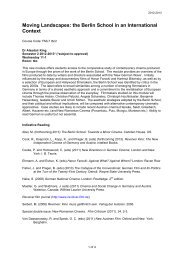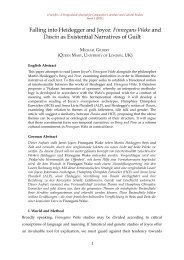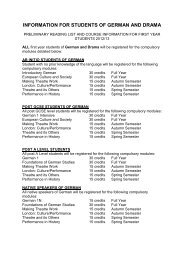You also want an ePaper? Increase the reach of your titles
YUMPU automatically turns print PDFs into web optimized ePapers that Google loves.
eTransfers. A Postgraduate eJournal for Comparative Literature and Cultural Studies<br />
Issue 1 (2011)<br />
makes such operations possible. A question that remains unanswered, however, is<br />
how exactly the brain ‘does’ cognition.<br />
Perowne’s questioning of the state of knowledge about brain and mind directly<br />
leads to the central problem upon which this paper focuses, namely the question of<br />
whether the methods of the empirical branch of cognitive science are sufficient to<br />
cover all possible kinds of knowledge of cognition. Is there not more to cognition<br />
than meets the empirical scientist’s eye? The argument of this paper is that fictional<br />
writing can develop an epistemic power in its own right that can provide a basis for<br />
producing knowledge of cognition different from, but by no means inferior to, sci-<br />
entific knowledge. Since <strong>Saturday</strong> is a novel that engages in a systematic way with<br />
cognition, its organic basis and several tenets of cognitive science, it can be desig-<br />
nated as a fiction of cognition. The main observation on which this argument rests is<br />
that literary fiction possesses the ability to combine several types of knowledge. For<br />
instance, Perowne possesses great amounts of knowledge about human bodies in<br />
general and about the brain in particular. This knowledge consists for the most part<br />
of a collection of facts about the brain. This is what one would intuitively regard as<br />
knowledge, namely ‘knowing-that’. However, when reading about Perowne operat-<br />
ing on a patient, one quickly notices that there is a different type of knowledge in-<br />
volved in his actions, namely a very pragmatic knowledge, a knowledge that con-<br />
cerns his bodily movements and the procedures he performs, probably without being<br />
able to frame it neatly into words. This type of knowledge is called ‘knowing-how’.<br />
Put differently, Perowne’s knowledge of the brain is twofold, consisting of facts and<br />
abilities at the same time. Both these components interact in that Perowne uses his<br />
‘knowing-that’ to generate ‘knowing-how’. The collection of facts that he knows<br />
guides the intelligent performance of delicate actions. The operating sequence to-<br />
wards the end of the novel, from which the epigraph is taken, is one of several in-<br />
stances in which propositional and procedural knowledge intermingle.<br />
This intertwining of several types of knowledge is mirrored in an intertwining of<br />
several aspects of cognition that are usually kept separate in empirical scientific re-<br />
search on cognition. Approaches in cognitive science that intend to capture the phe-<br />
3







